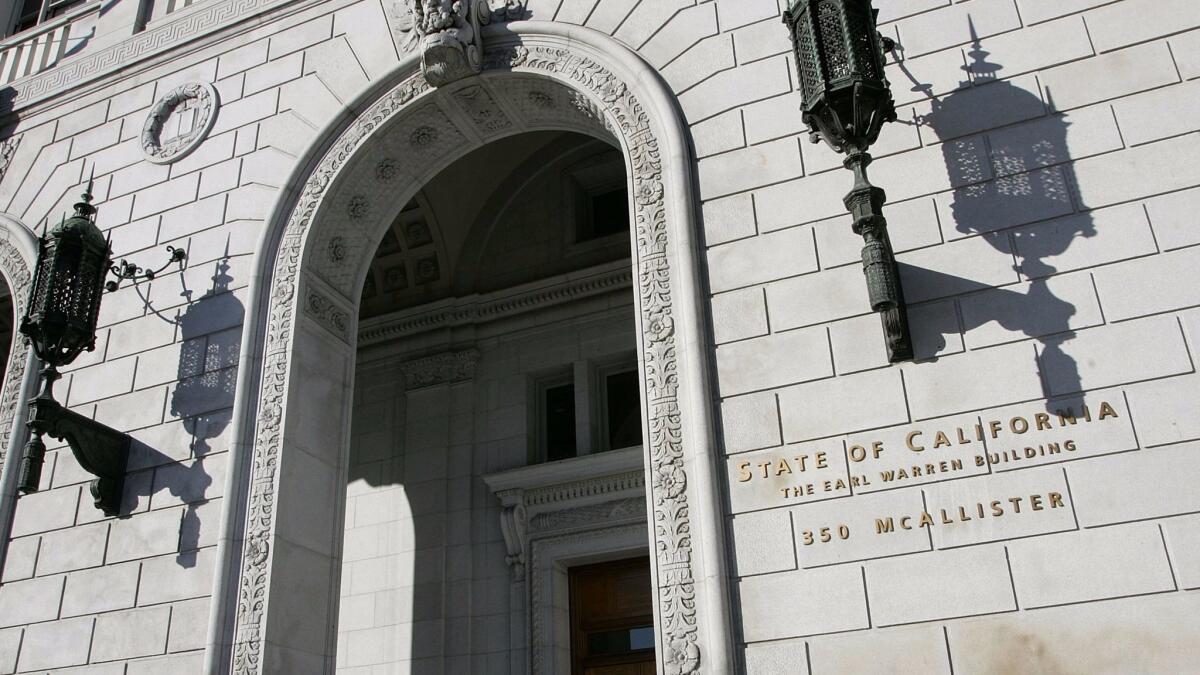Public officials can’t shield government business by using personal email, state Supreme Court rules

- Share via
Texts and emails sent by public employees on their personal devices or accounts are a matter of public record if they deal with official business, the California Supreme Court ruled Thursday in a unanimous decision hailed by open-government advocates.
But the court provided only general guidance on where the line would be drawn, posing a challenge for cities and counties forced to balance employees’ privacy against the public’s right to know.
The court said that communications sent on personal cell phones and computers must be disclosed to the public if they “relate in some substantive way to the conduct of the public’s business.”
“A city employee’s communications related to the conduct of public business do not cease to be public records just because they were sent or received using a personal account,” Justice Carol A. Corrigan wrote for the court.
Karl Olson, who represented the news media, including The Times, called the decision “a resounding victory for the public.”
He said the ruling sent “a strong message that public officials and employees should not try to evade public scrutiny by using personal accounts.”
Local governments throughout the state have expressed concerns that broad requests for information would be costly and might invade the privacy rights of workers.
The court acknowledged those concerns, saying it would not always be clear whether a communication had to be disclosed.
An email to a spouse complaining that a co-worker was an “idiot” would likely not be a public record, the court said, but an email to a supervisor reporting a co-worker’s mismanagement of a project probably would have to be disclosed.
Deciding whether something written in a personal account is public record will require an examination of the content, the purpose for which it was sent, the person to whom it was sent and whether the communication was prepared within the scope of the worker’s job, the court said.
Though the standard set by the court broadly favored public disclosure, “it is not so elastic as to include every piece of information the public may find interesting,” Corrigan wrote.
If the communication is primarily personal and contains only an incidental mention of an agency, it is not covered, she said.
The court ruled in a case brought by Ted Smith, a community activist who filed a public records request eight years ago for the communications of San Jose City Council members and staff about a proposed downtown development.
San Jose supplied some records in response to the request but said communications on private devices were not covered by the public records act. Smith sued, winning in a trial court but losing in a court of appeal.
Smith, 71, a former attorney who has been fighting for public access to government information for decades, called Thursday’s decision “the most important victory so far.”
He said it showed that California was a beacon for the rest of the country and expressed hope that the federal government and the Trump administration might take note.
Cities, counties and other local governments in California had urged the court to side with San Jose, arguing they lacked the funds to ensure communications on private devices were disclosed and feared liability if some information on personal devices was not found and produced.
Patrick Whitnell, general counsel for the League of California Cities, said the ruling was unclear about whether cities could be held responsible for employees who fail to make required disclosures.
“I would have liked the court to have provided more concrete guidance,” he said.
He also expressed concern about how cities could ensure that text messages were preserved. Preserving voicemails, which the decision did not directly address, would even be more problematic, he said.
The ruling does not require government to search the private devices of employees, but only to make “reasonable efforts” to obtain the information.
The court cited a policy developed by the Washington state Supreme Court, which said employees could be required to write declarations explaining how they searched their accounts, what they found and why they decided certain communications were not public records.
Olson, the news media attorney, argued in the case that the intent of the California Public Records Act to was to make government business public, even though the law was written before the advent of the Internet and cellphones.
He cited a host of cases involving public officials who used private email accounts for government business in Los Angeles, San Diego, San Francisco and Sacramento.
On the national level, Hillary Clinton used a personal email account for work while she was Secretary of State, and staff members of New Jersey Gov. Chris Christie used emails to stage a massive traffic jam to punish a Christie foe.
David Snyder, executive director of the First Amendment Coalition, said the decision closed what had become a loophole in the public records act.
“If employees are conducting written business about the people’s business on email, that ought to be available to the public,” said Snyder, whose group promotes free speech and government transparency. “It shouldn’t matter if the email is privately owned or owned by the government.”
Twitter: @mauradolan
UPDATES:
2:25 p.m.: This article was updated with additional reaction.
11:10 a.m.: This article was updated with reaction.
10:40 a.m.: This article was updated with additional details from the decision.
This article was originally posted at 10:10 a.m.
More to Read
Sign up for Essential California
The most important California stories and recommendations in your inbox every morning.
You may occasionally receive promotional content from the Los Angeles Times.











